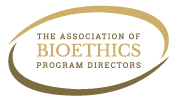Master’s Degree
|
| Please indicate the type of degree associated with your educational program: |
Master of Science (MS) |
| Educational program name: |
Columbia University In-Person and Hybrid Masters of Bioethics Programs |
| What institution administers your educational program? |
Columbia University |
| What bioethics program, department, or division administers your educational program? |
Masters of Bioethics Program |
| City: |
New York |
| State/Province: |
New York |
| Country: |
United States |
| Year first class matriculated: |
2009 |
| Educational program website: |
|
| Does the educational program have a designated faculty program director? |
Yes |
| Program Directors Name |
Robert Klitzman, MD |
| Program Directors Title |
Program Director, and Professor of Psychiatry, College of Physicians and Surgeons and Joseph Mailman School of PublicHealth |
| Program Directors Email |
rlk2@columbia.edu |
| Program Directors Phone |
646-774-6912 |
| Does the educational program have a designated staff program administrator? |
Yes |
| Program Administrators Name |
Patricia Contino |
| Program Administrators Title |
|
| Program Administrators Email |
pc2561@cumc.columbia.edu |
| Program Administrators Phone |
646-774-6912 |
| What are the educational program’s admission requirements? |
Degree(s)
Transcript(s)
Standardized test(s)
Letters of recommendation
CV or resume
Statement of interest |
| Degree(s) |
Master’s degree |
| Standardized test(s) |
GRE, MCAT or LSAT unless applicant has prior graduate degree
|
| Number of letters of recommendation: |
2 |
| Is the educational program offered with a dual degree? |
Yes |
| In conjunction with what other degree(s) is the educational program offered? |
MPH
|
| What is the minimum length of time to complete the full-time educational program? |
|
| What is the minimum length of time to complete the part-time educational program? |
|
| What is the typical length of time to complete the full-time educational program? |
|
| What is the typical length of time to complete the part-time educational program? |
|
| Is the educational program offered online or in-person? |
In-person only |
| What is the educational program’s average annual new trainee enrollment size? (Average over the last two years) |
23 |
| What is the cost per credit? |
|
| What is the educational program’s total tuition and fees? |
|
| More information on tuition: |
The amount varies whether the student wishes to take the courses for credit or not. The not for credit option is one-third the tuition. We also have various scholarships available. Many students also take government-sponsored loans. |
| Does the educational program offer tuition scholarships? |
Yes |
| Please describe what types of scholarships are available: |
Several different kinds are available |
| Does the educational program offer an annual stipend for trainees? |
No |
| What is the stipend per trainee? |
|
| What, if any, specific tracks/specializations are offered as part of the educational program? |
Clinical ethics, research ethics, public policy and ethics |
| How many credit hours are required to graduate? |
36 |
| How many courses are required to graduate? |
12 |
| Required course |
Philosophy of Bioethics
Research Ethics
Introduction to Clinical Ethics
Law and Bioethics
Global Bioethics
Masters Thesis
|
| Elective |
Advanced Clinical Ethics
Empirical Ethics
Neuroethics
Reproductive Ethics
Clinical Ethcs Practicum
Environmental Ethics
E-Health and Ethics
Ethics and the Pharmaceutical Industry
Pastoral Care and Bioethics
Journalism and Bioethics
Masters Thesis Workshop
Clinical Ethics Consultation
Clinical Ethics Practicum
Science for Bioethicists
Journalism and Bioethics
Religion and Bioethics
Health policy and ethics
Science for Bioethicists
|
| Is there a clinical component associated with the educational program? |
Yes |
| Does the educational program provide training in clinical ethics consultation? |
Yes |
| On average, how many clinical ethics consultations do your trainees participate in as an observer? |
|
| On average, how many formal clinical ethics consultations do your trainees lead? (i.e., interact with the provider/patient/surrogate and write the chart note)? |
|
| Do all of your trainees lead a minimum of 30 clinical ethics consultations (i.e., interact with the provider/patient/ surrogate and write the chart note)? |
No |
| Is the training in clinical ethics consultation grounded in the ASBH Core Competencies? |
Yes |
| Are trainees periodically assessed and evaluated for meeting the skills and knowledge necessary to carry out clinical ethics consultations in accord with the ASBH Core Competencies? |
No |
| How are trainees evaluated? |
|
| Do trainees complete an oral exam offered by a panel of three clinical ethics fellowship program directors? |
No |
| Are graduates purported by the educational program to be competent to conduct independent clinical ethics consultations? |
No |
| Does the educational program require any of the following to graduate? |
Thesis |
| Do graduates receive a certificate or diploma upon successful completion? |
Yes |
